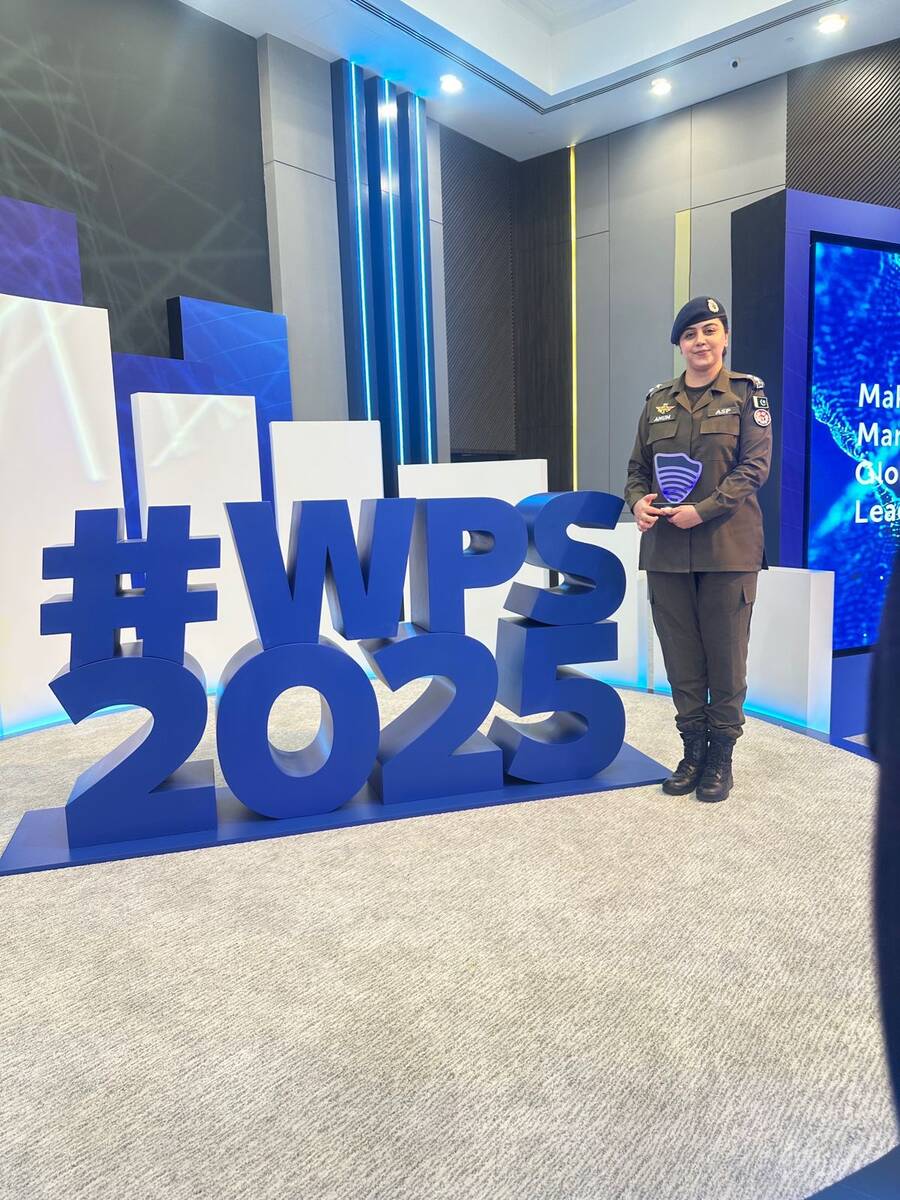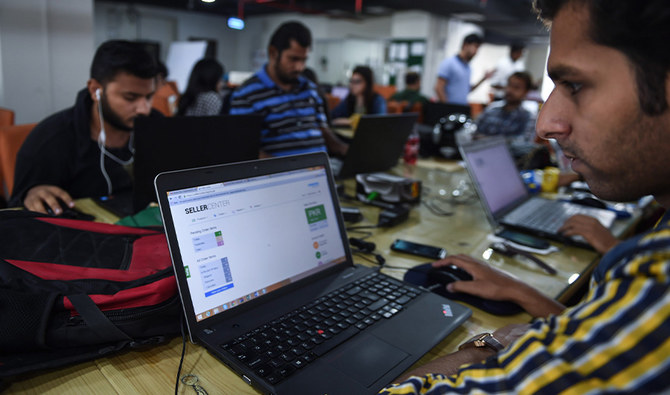PESHAWAR: More than a 100,000 people in Pakistan’s northwestern Khyber Pakhtunkhwa province are believed to have been scammed out of Rs.5.6 billion by an online investment company that investigators failed to crack down on despite early reports of fraud, officials, lawyers and victims of the crime have said.
The company, PSlash, opened an office in Peshawar’s Deans Trade Center in January this year, promising profits of up to 13 percent on investments in real estate and digital and foreign currency. On its last day of operation on November 19, the firm had 105,000 registered investors, a former employee told Arab News.
But on November 20, a notification appeared on the website: “System is hacked.” Since then, victims of the scam say they are unable to reach any of the people who had said they were employed with the company. Many have lost their entire lifesavings.
The loss could have been avoided, lawyers and victims of the fraud say, if investigators and regulators had reacted in time. Indeed, reports of problems with the company were filed months before the company shuttered in November.
Jamal Afridi, an attorney for Yaseen Ullah, one victim of the scam, said he first filed a fraud report with the Federal Investigation Agency (FIA) on August 24 and another one with the Pakistan Telecommunication Authority (PTA) on September 16, saying the agencies “were sleeping when we were knocking at their doors.”
“On behalf of Yaseen Ullah, I met high officials and submitted written complaints to PTA, FIA and police about the suspected fraud company PSlash but no one took it seriously,” the Supreme Court advocate told Arab News.
“If the concerned departments had taken action accordingly, this billions of rupee scam would not have happened in Peshawar,” he added. “Now the government should investigate this issue and punish the concerned officers ... because of their negligence thousands of people lost money.”
Asad Khan, a provincial officer at the FIA, admitted that the online fraud was worth “billions of rupees” but declined to comment when asked why investigators had not acted earlier, despite reports of fraud.
“Right now, we are not in a position to disclose the initial progress [in the case],” he said.
PTA spokesman Khurram Mehrab told Arab News that the regulator started investigating PSlash after receiving a complaint in September, but declined to give more details.
“After receiving the compliant, we started an investigation into this online fraud,” he said. “There are thousands of websites, and until there is a complaint, PTA can’t monitor each and every one.”
It is unclear to date who the owner of PSlash was, but one police report filed in Peshawar names a Rabia Batool. However, neither investors nor former employees of the company that Arab News spoke with have ever met Batool.
Victims said they were in touch with two men called Wasim Zeb and Nabeel Khan who presented themselves as local executives of the company.
“I only knew the local executives and they would tell us that PSlash is a worldwide [company] investing in forex, digital currency and real estate trade,” a former employee told Arab News on condition of anonymity.
He said the company had changed its name three times, from Earn Bitcoin to Payslash and finally to PSlash. When investors questioned its credibility, agents and managerial staff would tell them that it was registered with the Company Security Exchange of Pakistan (CSEP).
A database of companies on CSEP’s website does not include the name of PSlash.
For now, there is no respite for victims of the fraud, many of whom are poor laborers who invested their entire life savings in the scheme.
Muhammad Noor, a daily wage earner, said a friend advised him to borrow money from relatives to invest in PSlash and make a quick profit. He invested Rs2.5 million ($15,625).
“Now I am under an unbearable burden,” he said. “I have already sold my wife’s jewelry.”
Construction contractor Abid Afridi invested Rs500,000 ($3,125) and received one interest payment of Rs10,000 ($62.5) — but only in the first month after the investment.
“It’s very unfortunate and shocking for me and my family that we have lost our savings,” he said. “I am unaware of the legal process and no one knows what to do now.”
Abdur Rehman, who invested Rs1.5 million ($9,375) in the business, said he and several other investors had paid the money to PSlash in person and in cash.
In November, Rehman said, a few of the investors had managed to trace Zeb, the alleged company employee, who had promised to recover their lost funds.
“I am with you and will recover your money soon,” Rehman said, quoting Zeb from the meeting. “But he has since disappeared into thin air.”
Scammers rob Rs5.6 billion in online investment fraud in Pakistan’s northwest
https://arab.news/bdavf
Scammers rob Rs5.6 billion in online investment fraud in Pakistan’s northwest

- PSlash opened an office in Peshawar in January promising profits of up to 13 percent on investments in real estate and digital and foreign currency
- On its last day of operation on November 19, the firm had 105,000 investors, on November 20 a notification on the website read “System is hacked“
President Zardari visits troops in Gujranwala, lauds swift military response to Indian attack

- He praises people who lost their lives during the conflict, calling their sacrifice a source of national pride
- Pakistan says its response to New Delhi culminated in a successful pushback that neutralized the threat
ISLAMABAD: President Asif Ali Zardari on Saturday praised the armed forces for swiftly repelling an Indian attack, saying they had changed the battlefield dynamics “within a matter of hours” in a recent military confrontation.
The comments came during a visit to Gujranwala Cantonment, where the president met with troops and top military leadership, including Chief of Army Staff General Asim Munir.
Zardari’s remarks refer to Pakistan’s military retaliation, launched in response to Indian missile and drone attacks last week in various parts of the country.
The operation, according to Pakistani officials, culminated in a successful pushback that neutralized the threat and shifted the momentum on the ground.
“History will bear witness to how, within a matter of hours, the Pakistan Armed Forces repelled aggression with unmatched precision and resolve, sending an unequivocal message of Pakistan’s strength, resilience and national unity,” Zardari said, according to a statement from the military’s media wing.
During his visit, the president paid tribute to both military personnel and civilians who lost their lives in defense of the country, calling their sacrifice “a sacred trust and a source of enduring national pride.”
He also congratulated troops on the conclusion of the military operation, praising their morale, combat readiness and commitment to safeguarding national sovereignty.
The visit came amid heightened tensions between Pakistan and India following cross-border hostilities, though both sides have now been observing a fragile ceasefire.
The president was also accompanied by interior minister Mohsin Naqvi and received at the cantonment by senior army commanders from Gujranwala and Mangla Corps.
Pakistan detains four deportees linked to human smuggling after UAE convictions

- The suspects arrived in Pakistan on emergency travel documents after serving their sentences in the UAE
- Pakistan has intensified its crackdown on human smuggling networks following migrant boat tragedies
KARACHI: The Federal Investigation Agency (FIA) on Saturday detained four men deported from the United Arab Emirates (UAE) for their alleged involvement in human smuggling and prostitution, as Pakistan intensifies its crackdown on such networks following a series of deadly migrant boat tragedies.
The suspects were arrested upon arrival at Karachi’s Jinnah International Airport, according to an FIA statement, after being convicted in the UAE for participating in illegal activities. After serving their sentences, they were deported to Pakistan on emergency travel documents.
“FIA Immigration carries out a major operation,” the statement said. “Four suspects arriving from the UAE have been taken into custody. The suspects were involved in illegal activities in the UAE.”
“The suspects have been transferred to the Anti-Human Trafficking Circle in Karachi for further legal action,” it added.
The arrests come amid Pakistan’s broader campaign against human smuggling, which has gained urgency following multiple migrant boat disasters involving Pakistani nationals.
Earlier this year, over 40 Pakistanis were feared drowned near Morocco’s coast while in 2023 more than 200 Pakistanis were presumed dead in a shipwreck off Greece.
Prime Minister Shehbaz Sharif has vowed to dismantle human smuggling networks that lure citizens into perilous journeys with false promises of better lives abroad.
“Global cooperation is essential to combat prostitution carried out under the guise of human smuggling,” the FIA said.
“All available resources are being utilized to eliminate human smuggling,” it added.
Envoy shares potential of Pakistan freight corridors, ports for regional connectivity at Dubai event
Envoy shares potential of Pakistan freight corridors, ports for regional connectivity at Dubai event

- The Global Logistics Alliance conference brings together over 2,000 industry leaders, experts and potential partners to explore logistics opportunities
- The development comes as Pakistan strives to boost trade, overseas investment amid a gradually healing macroeconomic environment after a prolonged downturn
ISLAMABAD: Pakistan’s Envoy to the United Arab Emirates (UAE) Ambassador Faisal Niaz Tirmizi has underscored Pakistan’s freight corridors, port projects at a global logistics conference in Dubai, saying the South Asian has the potential to become a crucial hub for regional trade, transport and economic cooperation.
Ambassador Tirmizi said this while delivering a keynote address at the 12th Global Logistics Alliance (GLA) conference in Dubai, according to Pakistan’s Press Information Department (PID).
The three-day event, running from May 15 till May 18, has brought together over 2,000 industry leaders, experts and potential partners from 130 countries to network, acquire knowledge and explore opportunities in the logistics sector.
In his speech, Ambassador Tirmizi highlighted Pakistan’s strategic location at the crossroads of South Asia, Central Asia and West Asia as well as the Middle East.
“Pakistan is poised to become a vital corridor of connectivity and cooperation across the region,” he said, lauding the UAE-based firms DP World and AD Ports for their investments in freight corridors and port development projects in Pakistan.
The development comes as Pakistan strives to boost trade and overseas investment amid a gradually healing macroeconomic environment after a prolonged downturn that forced Islamabad to seek external financing from friendly nations and multiple loan programs with the International Monetary Fund (IMF).
The Pakistani government has pursued aggressive economic diplomacy in recent years, signing several agreements and memoranda of understanding with countries in Central Asia and the Middle East.
In her remarks, GLA President Grace Sun emphasized the importance of the event in creating new business synergies and accelerating global logistics collaboration.
On the sidelines of the conference, Ambassador Tirmizi and Sun discussed the potential of organizing a regional networking conference in Pakistan under the GLA framework, with a focus on engagement from South and Central Asian logistics stakeholders, according to the PID.
Ambassador Tirmizi reaffirmed Pakistan’s commitment to working with international partners to develop “smart, efficient, and sustainable logistics infrastructure,” particularly through transformational initiatives like the China-Pakistan Economic Corridor (CPEC).
Pakistani animated film ‘The Glassworker’ heads to US theaters with Watermelon Pictures

- The Pakistani animated film revolves around two people from disparate backgrounds, a glassblower and a violinist
- The movie, selected as Pakistan’s submission to the 2025 Academy Awards, took the animation world by storm in 2024
ISLAMABAD: Pakistan’s first hand-drawn animated film “The Glassworker” is set to screen in the United States (US) after Watermelon Pictures acquired its distribution rights, the US-based film production and distribution company said this week.
The Glassworker, released in Pakistan in July last year, was storyboarded by young Pakistani animator, Usman Riaz, who also directed the movie that comprised 1,477 cuts and 2,500 individual drawings, bringing to life the coming-of-age tale of two people from disparate backgrounds: young Vincent who is an apprentice at his father’s glass workshop, and the talented violinist Alliz, the daughter of a military colonel.
Around them, a war threatens to upend their lives and the relationships between the children and parents are tested. A total of 250 people worked on the film including national and international cast and crew.
In a post on Instagram, Watermelon Pictures said they were proud to announce that their very first animated feature, The Glassworker, would soon be coming to US theaters.
“After being selected as Pakistan’s submission to the 2025 Academy Awards, #TheGlassworker took the animation world by storm as Pakistan’s first ever hand-drawn animated feature,” the distribution company said.
“An ode to Hayo Miyazaki’s dedication to telling beautiful stories frame by frame, The Glassworker is truly a work of art.”
The deal was closed during Cannes and negotiated by Hamza Ali for Watermelon Pictures and Hélène Espeisse on behalf of Charades, which is representing the film at this year’s Marché Du Film, US entertainment website DEADLINE reported.
“The Glassworker is a breathtaking, emotional story that will resonate deeply with audiences of all ages. We are honored to bring this cinematic gem to US theaters,” Watermelon Pictures co-founder Hamza Ali was quoted as saying.
Ali launched the film production and distribution company in April, 2024 along with his brother, Badie Ali, with Alana Hadid as creative director. The firm aims to amplify the voices of underrepresented filmmakers across the globe.
“We are thrilled that The Glassworker will be released theatrically in the United States by Watermelon Pictures. Their rapid growth and recent string of successful, meaningful films make them the perfect partner to bring our work to American audiences,” Khizer Riaz, the film’s producer, was quoted as saying.
“We couldn’t be more excited.”
Pakistani woman police officer wins Global Investigation Award in Dubai

- ASP Anum Sher Khan was awarded at the World Police Summit 2025 for the rescue of two young girls from human traffickers and arrest of suspects
- Another Pakistani officer, Muhammad Isa Khan, secured the second position in the ‘Best Artificial Intelligence Implementation in Policing’ category
KARACHI: A Pakistani woman police officer, Anum Sher Khan, has won the prestigious ‘Excellence in Criminal Investigation’ award at the 2025 World Police Summit Awards in Dubai, the Punjab police said on Friday.
The World Police Summit 2025 featured conferences, strategic sessions and workshops that focused on four main areas, including combating organized crime and promoting community policing, the use of artificial intelligence in policing, capacity-building for junior officers, and enhancing road safety and traffic enforcement.
Themed as “Beyond the Badge: Envision the Next Era of Policing,” this year’s summit explored critical global challenges such as cross-border crime, public-private security collaboration, and AI integration across law enforcement. The four-day event featured 12 core policing tracks delivered across four specialized conferences, covering topics like cybercrime, border security, anti-narcotics efforts, road safety, and human trafficking.
Khan said she was recognized for her successful rescue of two young girls from human traffickers and bringing the perpetrators to justice, adding the award validates her team’s dedication and acknowledges the positive impact of their work on the lives of victims and their families.
“I’m deeply honored to have received the Criminal Investigation Award, representing the Police Service of Pakistan at an international forum,” Khan, who currently serves as Sub-Divisional Police Officer (SDPO) Sargodha, told Arab News.

“This case underscores the critical role of law enforcement in safeguarding vulnerable populations. I’m grateful for the recognition and look forward to continuing Punjab Police’s efforts in making our communities safer. The World Police Summit provides a valuable platform for sharing best practices and recognizing excellence, and I’m proud to be part of it.”
In a post on Facebook, Punjab Inspector-General Dr. Usman Anwar congratulated Khan on winning first position in the Excellence in Criminal Investigation Award 2025 category for her “outstanding performance in criminal investigation.”

“Talented police officers like ASP Anum Sher Khan are the pride and valuable asset of Punjab Police,” Dr. Anwar was quoted as saying.
The jury considered police officers from 192 countries for the awards in various categories, and Khan was not the only Pakistani police officer whose exceptional services were recognized at the event.
“DPO [District Police Officer] Kasur Muhammad Isa Khan was awarded second position for his high performance in the ‘Best Artificial Intelligence Implementation in Policing Award’ category,” the Punjab police said.
Organized under the patronage of the UAE government, the World Police Summit is one of the most prominent global platforms for recognizing excellence in policing. The recognition of Pakistani police officers.












